
Arthur Schwartz was an American composer and film producer, widely noted for his songwriting collaborations with Howard Dietz.
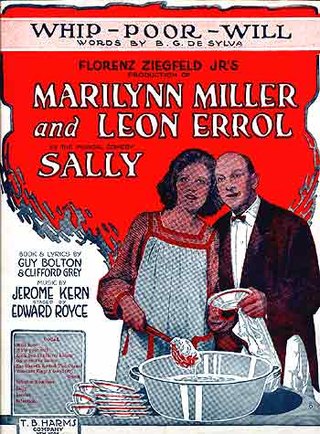
Sally is a musical comedy with music by Jerome Kern, lyrics by Clifford Grey and book by Guy Bolton, with additional lyrics by Buddy De Sylva, Anne Caldwell and P. G. Wodehouse. The plot hinges on a mistaken identity: Sally, a waif, is a dishwasher at the Alley Inn in New York City. She poses as a famous foreign ballerina and rises to fame through joining the Ziegfeld Follies. There is a rags to riches story, a ballet as a centrepiece, and a wedding as a finale. "Look for the Silver Lining" continues to be one of Kern's most familiar songs. The song is lampooned by another song, "Look for a Sky of Blue," in Rick Besoyan's satirical 1959 musical Little Mary Sunshine.

Edward Harrigan was an Irish-American actor, singer, dancer, playwright, lyricist and theater producer who, together with Tony Hart, formed one of the most celebrated theatrical partnerships of the 19th century. His career began in minstrelsy and variety but progressed to the production of multi-act plays full of singing, dancing and physical comedy, making Harrigan one of the founding fathers of modern American musical theatre.

Battling Butler is a 1926 American comedy silent film directed by and starring Buster Keaton. It is based on the 1923 musical Battling Buttler. The film entered the public domain in 2022.

London Calling! was a musical revue, produced by André Charlot with music and lyrics by Noël Coward, which opened at the Duke of York's Theatre, London on 4 September 1923. It was Noël Coward's first publicly produced musical work. The song "Parisian Pierrot", sung by Gertrude Lawrence, was his first big hit and became one of his signature tunes.
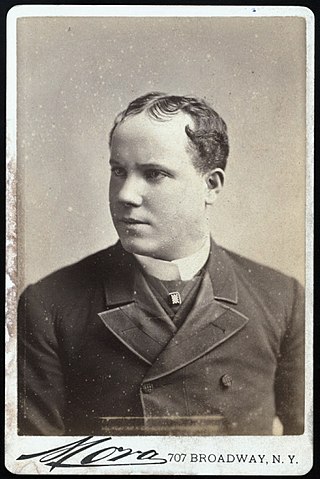
Tony Hart was an American actor, comedian and singer. He is best known for working with Edward Harrigan in the late 19th century comedy team of Harrigan & Hart.
Philip Braham was an English composer of the early twentieth century, chiefly associated with theatrical work. From 1914, he composed music for such musicals and revues as Theodore & Co (1916) and London Calling! (1923), including several revues produced by André Charlot. His best-known song is "Limehouse Blues," which has been recorded by many artists. He wrote for film in the 1930s.
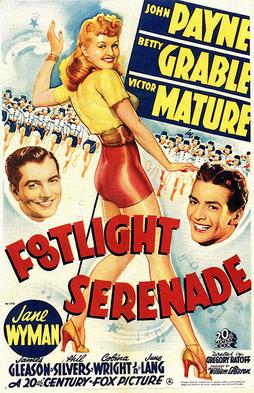
Footlight Serenade is a 1942 musical comedy film directed by Gregory Ratoff, starring Betty Grable, John Payne, and Victor Mature.
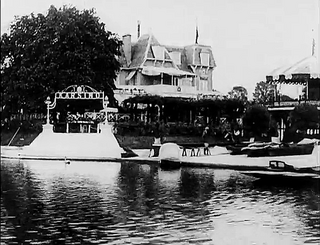
The Karsino was a hotel on Tagg's Island in the London Borough of Richmond upon Thames which stood from 1912 until 1972.

The Night Boat (1920) is a musical in three acts, based on a farce by Alexandre Bisson, with a book and lyrics by Anne Caldwell and music by Jerome Kern. The story lampoons the notorious New York City-to-Albany night boat, on which clandestine romances were common.

"Limehouse Blues" is a popular British song written by the London-based duo of Douglas Furber (lyrics) and Philip Braham (music).
The Klaw Theatre was a Broadway theatre located at 251–257 West 45th Street in Midtown Manhattan. Built in 1921 for producer Marcus Klaw, the theater was designed by Eugene De Rosa. Rachel Crothers' Nice People was the opening production in 1921 with Tallulah Bankhead and Katharine Cornell in her debut Broadway role albeit a small one.

Wildflower or The Wildflower, is a musical in three acts with book and lyrics by Otto Harbach and Oscar Hammerstein II and music by Herbert Stothart and Vincent Youmans. The plot concerns a pretty Italian farmgirl, Nina, who has a fiery temper. She stands to inherit a fortune provided that she can keep her temper under control for six months. If she fails, the money goes to her cousin Bianca, who tries to provoke her. She manages to do it, and gets the money, as well as her man, Guido. Several of the songs were published, among which "Bambalina" and the title song were the most popular. The musical proved to be Day's last Broadway show before moving to London.

Mary Jane McKane is a musical comedy in three acts with book and lyrics by William Cary Duncan and Oscar Hammerstein, II and music by Herbert Stothart and Vincent Youmans. The show was produced by Arthur Hammerstein at the Imperial Theatre, and opened December 25, 1923.

Stepping Stones is a "fantastical musical play" in two acts with book by Anne Caldwell and R. H. Burnside, lyrics by Anne Caldwell, and music by Jerome Kern. The show was produced by Charles Dillingham at the Globe Theater, and opened November 6, 1923.

Dew Drop Inn is a musical with music by Alfred Goodman and Rudolf Friml, lyrics by Cyrus Wood, and a book by Walter DeLeon and Edward Delaney Dunn. While Goodman was the principal composer for the work, composers Rudolf Friml, John Frederick Coots, and Jean Schwartz also contributed songs to the show in collaboration with lyricist McElbert Moore.
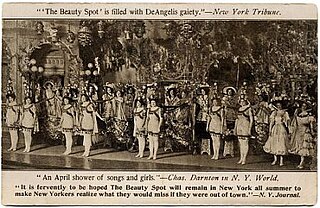
The Beauty Spot was a 1909 musical comedy in two acts that played for 137 performances at the Herald Square Theatre in New York with music by Reginald De Koven, a book by Joseph W. Herbert and additional lyrics by Terry Sullivan. The musical provided early appearances for the actresses Lillian Worth and Evelyn Laye.
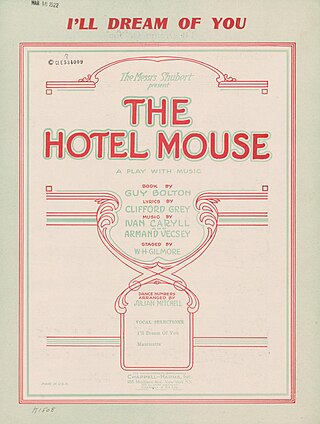
The Hotel Mouse is a musical comedy with music by Armand Vecsey and Ivan Caryll, lyrics by Clifford Grey, and book by Guy Bolton, with additional music by Bert Hanlon, and additional lyrics by Alfred Bryan. The book is based on the French comedy Le souris d'hôtel by Marcel Gerbidon and Paul Armont and concerns a female cat burglar in Monte Carlo given the nickname "the hotel mouse" by the local police; one of her marks falls in love with her.
Plantation Revue was a 1922 revue put together by Lew Leslie, featuring some of the more popular musical numbers and comedy acts that he had hired at Harlem's Plantation Club.

















